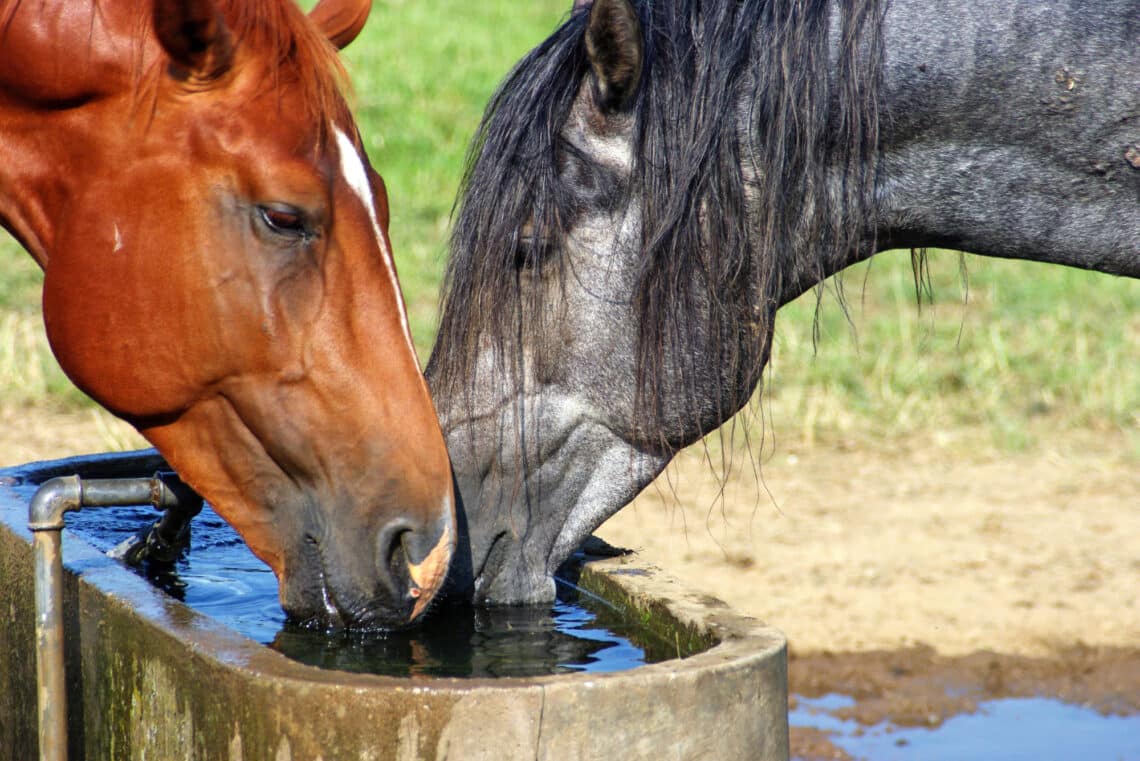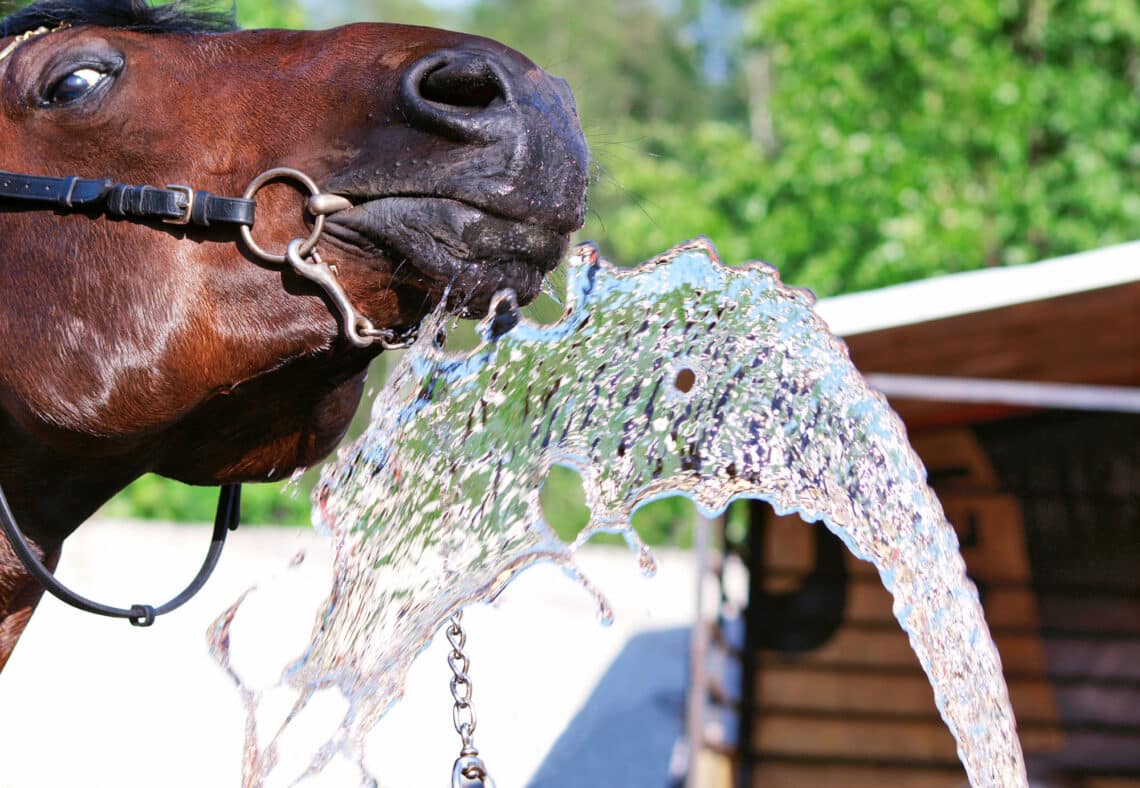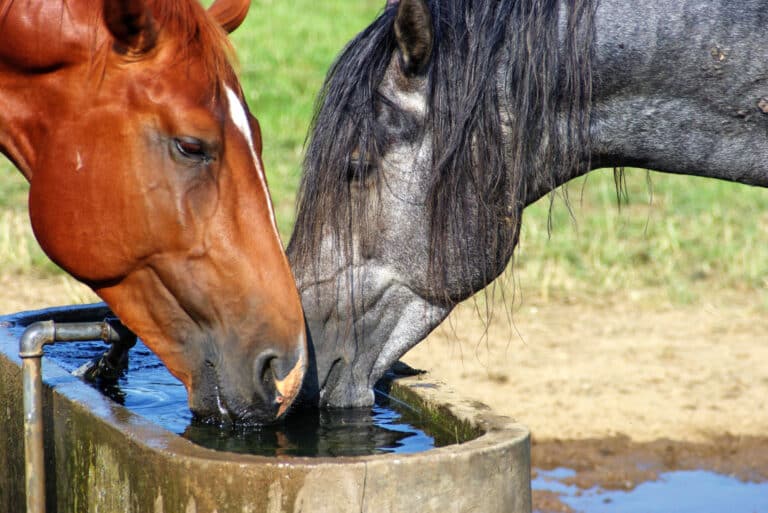
Hydration through the summer heat
As the weather warms up, keeping your horse adequately hydrated has to be front of mind. Equine nutritionist LARISSA BILSTON offers her expert advice.
As temperatures rise during the summer, horse owners face the challenge of ensuring their equine companions stay hydrated and healthy. Working horses during very hot and/or humid weather can be potentially dangerous (even fatal) due to the risks of dehydration, heat exhaustion, and heat stroke.
In this article, we’ll explore the importance of hydration, signs of dehydration, strategies to keep your horse hydrated, and tips for managing their health during the hot summer months.
The importance of hydration
Water is essential for all living beings, and horses are no exception. A horse’s body is made up of about 60-70% water, which is crucial for various physiological functions. Water is needed for digestion, blood circulation, temperature regulation, and the elimination of waste. Without adequate water intake, a horse’s health can quickly deteriorate, leading to serious, sometimes fatal, conditions.
Horses lose water primarily through sweat, urine, manure and breath. In hot weather, the rate of water loss increases significantly, especially when the horse is active. An average 500kg horse can drink between 30 to 50 litres of water a day, but during the summer and when in work, this amount can be much higher.
Signs of dehydration
Early recognition of the signs of dehydration is key to preventing serious health issues. In horses, some of the common signs include:
- Dry, tacky gums: A hydrated horse will have moist, shiny pink gums. Swipe the inside of your horse’s gums and if they look white or purple, or are dry or sticky to the touch, it could be a sign of dehydration.
- Prolonged skin tenting: The skin pinch test is a simple way to check for dehydration. Gently pinch the skin on the horse’s neck and release it. In a well-hydrated horse, the skin will quickly return to its normal position. If it stays tented or takes longer than a few seconds to return, your horse may be dehydrated.
- Dull eyes and lethargy: Dehydrated horses often have a dull, sunken appearance to their eyes and may seem lethargic or less interested in their surroundings. They may appear weak, fatigued and show signs of pain or trembling.
- Reduced urine output and tying-up: A dehydrated horse may produce less urine, and the urine may be darker and more concentrated. Dark urine, pain and stiffness can indicate that your horse is tying-up.
- Performance, thumps and colic: Dehydration can significantly impact a horse’s performance, making them tire more easily and be less responsive during exercise. Thumps (diaphragmatic flutter) and even colic can occur as a result of dehydration.
Hydration strategies
Preventing dehydration starts with ensuring your horse has consistent access to clean, fresh water. Here are some strategies to help keep your horse hydrated during the hot summer months:
Provide ample water: Make sure your horse has unlimited access to water at all times. If using automatic waterers, ensure they are functioning properly. Measure your horse’s water intake by turning the automatic system off and using buckets for a day if you’re concerned that they are not drinking enough. Check water sources regularly to ensure they are clean, cool and free of debris or algae, which can deter horses from drinking. Consider adding extra water troughs or buckets if you have multiple horses, to reduce competition and ensure every horse has access.
Keep water under cover to help keep it clean (especially if bat or bird droppings are likely to contaminate it) and manage temperature fluctuations.
Offer electrolytes: During hot weather or periods of heavy exercise, horses lose essential electrolytes through sweat. Adding an electrolyte supplement to your horse’s feed or water can help replenish these lost minerals and encourage them to drink more water. However, it’s important to provide plain water alongside water containing electrolytes because both are needed for optimal hydration (see details on electrolyte nutrition below).
Wet their feed: Adding water to your horse’s hard feed or offering soaked hay can increase their overall water intake. Beet pulp or other super fibres and soaked hay cubes are excellent ways to add moisture to their diet.
Shade and shelter: Providing ample shade and shelter is crucial to reducing the effects of the heat. Horses that are kept cool are less likely to become dehydrated. Ensure your horse has access to shaded areas, especially during the hottest parts of the day.
Schedule rides wisely: If you plan to ride or exercise your horse, do so during the cooler parts of the day, such as early morning or late evening. Avoid strenuous activities during peak heat, as this can exacerbate dehydration and heat-related stress.
Encourage drinking during travel: Horses often become dehydrated during travel, especially on long journeys in hot weather. Make frequent stops to offer water and, if possible, soak hay or feed during breaks. Some horses are reluctant to drink unfamiliar water, so consider bringing some from home or using flavoured additives to mask the taste of new water sources.
Monitor body condition: Keep a close eye on your horse’s overall condition. A horse who is sweating excessively or appears to be losing weight may need more attention to hydration and diet. Body condition scoring can help you track changes in your horse’s weight and muscle tone, which can indicate how well they are coping with the summer heat.

Managing electrolyte balance
Daily salt requirements: Horses require 7 to 12 grams of plain salt per 100kgs of bodyweight every day. This is the amount required for maintenance – even more is needed for sweat replacement on very hot days and following heavy exercise.
Since salt is usually added to pellets and grain mixes designed for horses, this salt must be counted in calculations of how much extra to add. Top up with plain salt (sodium chloride) which can be purchased as table salt, pool salt, flossy salt or stock salt. Free access to a container of clean, loose salt rather than a salt block is also advisable because many horses will not lick a block for long enough to meet their salt requirements.
Sweat replacement: Sweating horses can lose as much as 10 to 15 litres of fluid per hour. Dehydration occurs if this liquid is not replaced but plain water is not enough. The fluid in horses’ bodies contains various salts called electrolytes (mainly sodium, potassium, chloride, some calcium and magnesium, and traces of other minerals such as phosphorous, zinc and copper) which help manage the hydration of individual cells and blood volume. Horses need to be rehydrated with the right balance of water and electrolytes. Dehydration can worsen with too many electrolytes, and not enough water or too much water when electrolytes are depleted.
You can make a simple electrolyte blend that provides the major electrolyte salts lost in sweat by adding 45g plain table salt (sodium chloride) and 45g of Lite salt (potassium chloride/sodium chloride) to 10 litres of water. Apple juice can be added to improve palatability. This will replace the sodium, potassium and chloride lost in approximately 9 litres of sweat.
However, a faster recovery is often desirable for horses who work every day, are living in hot and humid environments, or are competing over a number of days. These horses will benefit from a well formulated commercial electrolyte supplement. Various supplements are available, containing the major electrolyte salts (sodium, chloride and potassium) as well as the electrolytes lost in smaller quantities (calcium and magnesium). They may also include amino acids and vitamins to aid recovery and sweeteners to improve palatability. A quality electrolyte supplement should not contain more than 20% sweeteners or fillers. Horses usually have to be trained to drink electrolytes so if planning to use them at a competition, make sure your horse is familiar with the taste in the weeks beforehand.
Always make fresh clean water available to a horse after sweating, and do not offer electrolyte-enhanced water without providing access to plain water.
Keeping them hydrated
Keeping your horse hydrated during the summer heat is essential to their health and well-being. By providing ample access to clean water, offering electrolytes, and managing their environment and activity levels, you can help prevent dehydration and the associated risks. Pay close attention to your horse’s behaviour and physical condition, and be proactive in addressing any signs of dehydration. With proper care and attention, your horse can stay hydrated and thrive, even in the hottest summer weather.
Larissa Bilston, BAgrSc (Hons) is the Equine Nutritionist for Farmalogic.



